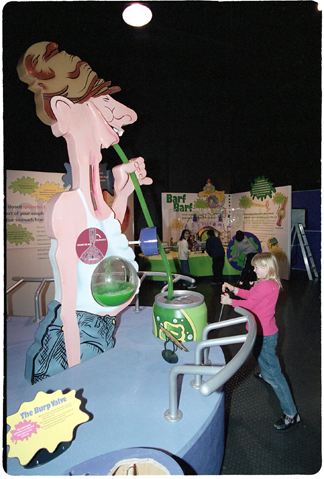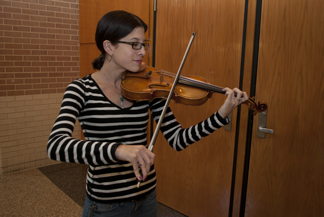NE seminar encourages students to work smarter
College students expect to feel overwhelmed at times, but there are ways of coping, a NE counselor told students Feb. 22.
Encouraging her audience to Work Smarter, Not Harder, Anita Peters said college can be like a road trip to Los Angeles that somehow ends up in Idaho.
“It was not lack of desire that I wasn’t getting there,” she said. “It wasn’t lack of effort there. It was either something askew with the GPS or with the map. Something was incorrect.”
Peters said students should manage their time and list everything in a master calendar, even times for sleep. Students need to review their calendars every day to save them the stress of having to ask, “Did I do it?” she said.
Students need to think of classes as their most important job and, as a result, should allow two hours outside of class for every class hour taken, Peters said.
Students should schedule classes at times they feel the most awake and should not register for more classes than they can handle, she said. Maintaining a high GPA is the important thing, she said.
If students see themselves struggling in one of their classes, she said, they should seek help immediately instead of waiting for things to get better because they most likely won’t. She urged students to go to their professors’ offices and, most importantly, to go to class.
Students will succeed as long as they stick with their schedules and don’t procrastinate, Peters said.
“Nobody comes to college to fail,” she said. “It’s the journey of a lifetime. If it were easy, everyone would do it.”
—Kelly Chown
TR students get tips on how to research easily
She has been dubbed the “Information Goddess,” and giving information on how to get information was her goal Feb. 21 on TR Campus.
TR Campus library services assistant director Danelle Ellis, her nickname radiating in sequins across her shirt, explained how to do Easy Research in a lunchtime workshop.
She instructed students how to use the library website and catalog to obtain information for projects and/or papers.
“I’ll teach you guys today how to do research quick and easy so you can get on with your life,” she said.
Google and similar search engines are not the ideal routes when researching, Ellis said.
“Honestly, using Google is like going to Wal-Mart, and there are no aisles,” she said. “Everything is on the floor piled up, and you have to sort through it.”
When researching, students can use four primary resources — books, magazines, newspapers and websites. Ellis explained how to cite each properly, how to narrow a search on a subject and how to track it down in the library stacks with the call number.
“You want to have a narrow search with only 15 to 20 maximum results,” she said.
Books are organized by category in the library so that whatever the subject, there may be entire sections devoted to it, she said.
Using a projector, Ellis guided students step by step through the research process using specific topics.
In addition, she told her audience how to find e-books and how to check them out after hours.
“Even if it is two in the morning when we’re closed, you can still use the system while at home or on any computer with Internet, 24/7,” she said.
—Hector Luna
NE workshop to explain importance of self-esteem
Students can learn that Self-Love and Self-Esteem Lead to Self-Empowerment at 11:15 a.m. March 8 in College Hall (NCAB 1111) on NE Campus.
“I will talk about Maslow’s hierarchy of needs, building positive affirmations,” said Lily Calzada, NW special services coordinator.
Maslow’s hierarchy of needs ranges from breathing, food and water at the bottom to morality, spontaneity, self-esteem and confidence at the top, she said. She will also address “cognitive distortions” from The Feeling Good Handbook by Dr. David Burns.
In the one-hour workshop, Calzada will explain ways to create self-esteem and self-love and then continue to address them in a more stable background.
Using known research to support her explanation, Calzada said she intends to show students how to better understand things like emotions and the way people think and will provide the tools to recognize other thinking patterns.
The main thinking styles she will discuss are assertiveness, aggressiveness and passive-aggressiveness.
The workshop will help guide students to “taking charge of your life through positive affirmations,” Calzada said.
—Heba Said
South Campus presents
JPS diabetes seminar
A hushed South Campus audience was told Feb. 22 that if current trends continue, one in three American adults will have diabetes by 2050.
Speaking on Diabetes Empowerment, Toya Norton, diabetes community outreach program coordinator for John Peter Smith Hospital, shared this statistic on diabetes as well as tips on how to maintain a healthy blood sugar level.
“Of the nearly 26 million Americans living with diabetes, a quarter — 7 million — have diabetes but don’t even know it,” she said.
Symptoms of undiagnosed diabetes include tiredness, fatigue, extreme thirst, skin wounds and extreme hunger, Norton said.
“Many more people are at risk of developing Type 2 diabetes,” she said. “Another 79 million American adults have pre-diabetes, placing them at increased risk for developing Type 2 diabetes.”
In Type 2 diabetes, Norton explained, the body either does not produce enough insulin or the cells ignore the insulin that is produced.
“Type 2 is the most common kind of diabetes, but there are steps that can be taken to deal with the symptoms,” she said. “With proper dieting and exercise, the symptoms of Type 2 diabetes can be managed.”
The Diabetes Empowerment series is a free four-part program presented by JPS. The program includes psychosocial, nutrition, exercise and informational seminars.
This is the fourth year that JPS has presented Diabetes Empowerment but the first year TCC has hosted a seminar.
—David Reid
County official to talk on breast, cervical cancer awareness, prevention
Whether a woman has medical insurance should not be a factor in determining early screening for breast cancer, NW Campus students will be told March 8.
Cheryl Loudermilk, a registered nurse and manager of the Tarrant County Health Department’s Breast and Cervical Cancer Control Program, will share eligibility guidelines for early detection screening for women who do not meet the program’s age or income criteria.
The American Cancer Society reports 2.6 million breast cancer survivors live in the United States.
The chances for a woman to develop invasive breast cancer during the course of her life is one in eight while the chance of dying from breast cancer is about one in 36.
The program, sponsored by the Texas Department of State Health Services, will be at 12:30 p.m. in WACB 1123.
—Luan Nguyen
Biggest Loser to speak on personal struggles during South luncheon
Sponsored by the South Women’s History Month Committee and health and physical education, a Brown Bag Luncheon will be held March 6 with a story about struggle and success.
Former contestant on The Biggest Loser and “Get Fit Texan of the Year” Tracey Yukich will speak about her dramatic transformation. She will share her story in hopes of inspiring those attending to become happier with themselves.
According to her website, she did not like the state she was in and was determined to change that.
“Is this really me living in this body?” Yukich asked herself before reshaping her life.
Yukich’s presentation will be 12:30-1:20 p.m. in the South Campus Gym. The event is free and open to the public.
—Yocelin Hernandez
South Campus seeking donors for blood drive
Three lives are saved with every pint of blood donated, according to the American Red Cross.
Many students said they would like to donate blood at the South Campus drive March 1, but timing will get in the way.
“I probably won’t be able to do it just because I won’t have time to stop,” student Valerie Freeze said.
Others had planned on attending and donating but won’t be on campus that day.
“I will, unfortunately, be out of town that day,” student Rebecca Chairez said. “For some reason, every time I try to give blood, I can’t. Either I’m not available, or they say something is wrong with my blood. It may be that my iron is low.”
Andrea Johnson said she did have an idea for future blood drives.
“I do give blood if I can,” she said. “Maybe if they offered it for multiple days, then I would probably do it.”
Some students simply have never donated before but may give it a try.
“I don’t know if I will. I’ve never given blood before,” student Juventino Martinez said. “Maybe I will if they give out a free T-shirt or snacks, though.”
Meanwhile, Spanish instructor Felipe Dobarganes believes if one is healthy enough and able to donate blood, it should be done.
“I give blood when I can about twice a year,” he said. “I think it’s something that is life-saving, so I think it is something we should all do if we are healthy and able to do so. And if you’re afraid of needles, look away!”
The Red Cross blood drive will be 9 a.m.-3 p.m. in the Health Services Building.
—Taylor Green
Arlington police officer to teach effects of alcohol
SE Campus students will hear March 6 how alcohol affects the body and harms both drinkers and those around them.
Arlington police officer Stacie Brown will describe alcohol’s impairment on motor functions, laws pertaining to alcohol and driving and fatal DWI accident statistics for Arlington. She will also show images of fatal accidents.
Brown’s presentation Alcohol Awareness will be at 10 a.m. in the North Ballroom.
—Justin Gladney






















